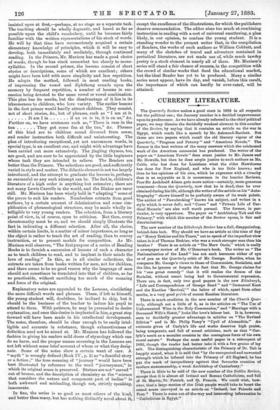There is much erudition in the new number of the
Church Quar- terly, although not a little of it, as in the articles on "The Use of Unfermented Wine in the Holy Communion," and "Marriage with a Deceased Wife's Sister," looks like love's labour lost. It is, however, seen to decidedly greater advantage in articles on "The Revised Edition" and in Mr. Philip Pasey's "Cyril of Alexandria." An estimate given of Carlyle's life and works deserves high praise, being temperate, and full of sound criticism, such as that " Car- lyle's merit as a moralist consists in the contagions force of his own moral nature." Perhaps the most useful paper is a retrospect of 1882, though the reader had better take it with a few grains of lay salt. The distinguishing characteristic of the Primacy of Dr. Tait is happily stated, when it is said that "by the unexpected and unwonted. strength which he infused into the Primacy of All England, he has pat the mark of inexpediency against that favourite creation of modern statesmanship, a weak Archbishop of Canterbury."






































 Previous page
Previous page